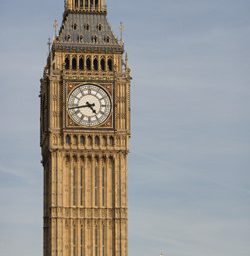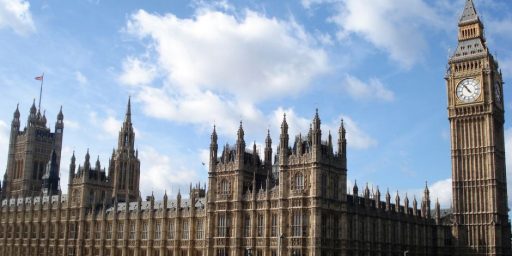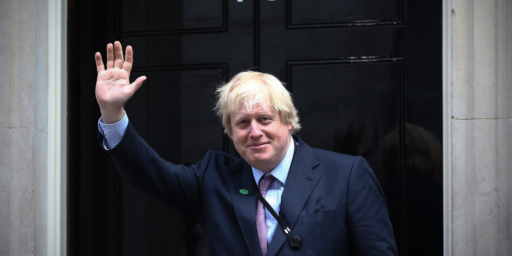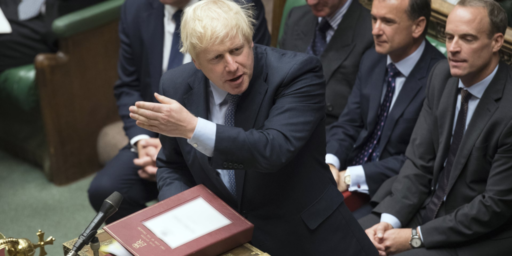No, 0.3% of UK Voters are not Choosing the Next PM
The NYT provides an incredibly bad take on parliamentary government.

As is too often the case with even the elite American press, the NYT has a pretty horrible take on the way the government, and specifically democratic accountability, works in a parliamentary system: The 0.3% of U.K. Voters Who Will Pick the Next Prime Minister .*
Gathered here were three dozen of the 160,000 or so party members who will choose the next Conservative leader and, therefore, prime minister, giving them unparalleled power to determine their country’s fate as it careens through the Brexit crisis.
This sliver of the population, just 0.3 percent of registered voters, is mostly white, aging and male. And it is poised to use its new clout — the party’s grass roots have never before picked a prime minister — to catapult Boris Johnson into Downing Street, potentially cleaving the world’s oldest and most successful political party as it sends Britain on the path to what could be a tumultuous Brexit.
Now, as the first paragraph quoted correctly notes, this process will select the next leader of the Conservative Party, and yes, the leader of the Conservatives will be the next PM.
But the headline of the piece is wrong in a really important way–this is not the selection of the PM. Further, the implication that the selection of the PM is in the hands of these few voters misses an essential aspect of parliamentary systems: the power to select the PM is in the hands of the party, or parties, that command a majority of seats. The PM requires their confidence. That the Conservative Party will have Johnson as its leader may well be an indictment on the Tories, but this is not some undemocratic process.
Specifically, the Tories won 318 of 650 seats in the Commons in 2017 which is 7 seats shy of 50%. Teresa May was able to form a minority government via a confidence and supply agreement with the DUP (Democratic Unionist Party) which 10 seats. Currently, the Conservatives have 312 seats and the DUP still 10 (which id shy of the needed 325 for a majority).
The Tory seats were won on 42.4% of the vote.
The democratic legitimacy for a PM Johnson comes from the fact that the party he will lead is the party that won the most votes and the most seats (and is able to secure enough support from a handful of other PMs to generate majority support in the House of Commons). This is a substantial amount of democratic legitimacy. It has nothing to do with how the Tories selected him as leader.
Indeed, while it certainly matters who the PM is (and Johnson is, in my estimation, likely to be a wreck, but that is beside the point). But, the entire process is one in which what actually matters most is the party or coalition that has the majority support in the House of Commons, support directly derived from the voters of the UK.
Now, if you want to criticize the UK system, I don’t think the way parties select their leaders is as key as the single seat district system with plurality winners (same as we use in the US). It creates representational distortions that some version of proportional representation would not.
For example: the Conservatives won 42.4% of the vote and won 48.9% of the seats while the second-place Labour Party won 40.0% of the vote, and only 40.3% of the seats. Or, worse, the Liberal Democrats who won 7.4% of the vote and won only 1.8% of the seats while the Scottish National Party won 3.0% of the vote and 5.4% of the seats.
At any rate, the next PM is being chosen by the House of Commons, and will be selected by the Conservatives, the party with the most seats and votes, in some kind of agreement with enough other members to generate at least an agreement to support a minority government.
The next PM is definitively not being selected by 0.3% of UK Voters.
Keep in mind, to, this process is just a final ratification of what was an internal party fight to being with.
To be clear: I understand that there is a process with limited participation that will endorse the next Tory leader. But that is not the same thing as choosing the PM. And focusing solely on that process misses the fundamental nature of the system under discussion.
*So I disagree with Doug Mataconis’ take, which I think it too influences by the NYT’s terrible job.






As I said in the comment thread to the other post on this topic, yes they’re picking the next leader of the Tories not the next PM but that seems like a distinction without a difference since Johnson will become the PM, and could stay in that position until at least 2022 depending on when the next election is. And it goes without saying that a Great Britain with Johnson as PM is likely to be very different from one with Teresa May (or David Cameron) as PM, for better or for worse.
Whether you measure the 100,000 or so people who will make that decision are arguably not representative of either the 66 million residents of the U.K. or the 13 million who voted for the Tories in the last election.
Yes, I understand that the voters who vote in 2015 and 2017 were voting for a party rather than an individual, at least technically, but as I said it became clear in both of those elections that the identity of the party leader is an important factor for at least some portion of the electorate. (For example, it’s possible that Labour would have done better with a leader with less baggage than Jeremy Corbyn, who has been controversial to say the least since becoming party leader in 2015.)
@Doug Mataconis:
The process to select leader of the party is distinct from the process that will allow the leader of the Tories to be PM. That is a huge distinction that, if ignored, ignores the very way that parliamentary government works.
Is there a term for subtweeting one of your own co-bloggers in a blog post? =)
The job of representing those people are the MPs in parliament. They have the democratically derived power to choose the PM and grant confidence to the government.
You are focusing too much on one part of the process.
@Stormy Dragon: I name him in the post 😉
Okay, I’m just going to back away from commenting in either this thread or the other one since I keep saying the same thing.
As I said, I understand how the system works in the United Kingdom. I am also criticizing how it works in this single respect. It’s my opinion and I suppose people can take it as they will.
More here: Basic Democratic Models.
Different question: How unique is this particular situation? Out of, say 10, Prime Ministers, how many get selected in a process where Commons is not shuffled in a national election first? IIRC, one of the issues that came with the “snap” election was that it precluded the option of having another election for some set–and relatively lengthy–period of time. This feature of this situation makes a significant difference (unless I was mistaken about the snap election thing).
My understanding of normal processes in the UK–and I don’t follow UK politics closely–is that under normal circumstances, a PM who cannot circle her (in this particular case) wagons on this type of an issue would be subjected to a vote of no confidence and the nation would vote for new MPs and those MPs would decide the new PM. My understanding is that the snap election short circuited that process.
I sort of get Doug’s disconnect; having a bunch of party insiders select a new party leader who will then be declared PM seems undemocratic. But this process is not the norm, either for Parliamentary governments or for the UK specifically, so it’s reasonable that things will not be as they usually would be–the rules disallow what would usually be (at least as I understand things). The question now is how much of an outlier this particular situation is relative to the norm.
Of course, the DUP may bolt and there goes the Conservatives majority and hello new elections.
@Just nutha ignint cracker:
Part of my point is: that is always how the party leader is selected. Yes, voters going into an election know who the leader is, but they don’t get to vote for the leader (unless they live in the leader’s constituency),
Rather, voters are voting for which party they want to govern them. It actually diminishes the significance of the leader and focuses more on the party having to have a coherent set of values (granted, Brexit has mucked that up quite a bit).
I would have to look, but off the top of my head, I don’t think this is all that unusual. May was first chosen leader (and PM) without an election. I am pretty sure John Major took over for Thatcher without an election–and I feel like there are several examples in between.
John Major became PM in 1990 when Thatcher resigned.
Blair became PM in 1997 via election
Gordon Brown became PM when Tony Blair stepped down in 2007
David Cameron came to power via election in 2010
Teresa May became PM when Cameron resigned in 2016
So, of the last 5 PMs, 3 came into office because the predecessor resigned (i.e., the Head of Government changed without an election being the cause).
I really think the NYT (and then Doug) is looking at this through a US-centric lens.
@Just nutha ignint cracker:
Something to think about: what is more democratic?
1) A system in which the party elites choose the leader, but where the party presents itself to the voters as having a fairly coherent governing philosophy (which binds the head of government).
or
2) A system in which a series of elections chooses the leader of the party, but if that party leader becomes head of government, that leader can reshape the whole party.
Note, for example, May was against Brexit, but when she became PM she was bound to follow the Conservative Party’s pro-Brexit position (because that is what the party ran on).
Contrast that to Trump and the GOP where now the party is pro-tariff. despite having presented itself as free trade for years.
Which scenario is one in which parties are actually more responsive to voters?
Presidents shape parties.
Parties shape Prime Ministers.
Small technical point (which may play into Dougs misgivings): IIRC, unlike, for example, in Germany, the MPs do not actually elect the PM. By costum, the party leader of the governing party is appointed as PM by the Queen. So the PM is technically elected by the party members, not the population at large (however indirectly). So there is a formal legitimacy issue.
However, the conservative PMs have a veto right in that they can, at any point, begin a vote of no confidence which will, if successful, automatically trigger a new party leader election.
@Ebenezer_Arvigenius: Sure, but the bottom line is that for the PM to remain PM, he/she needs the confidence of a majority party/coalition in the House.
@Steven L. Taylor: Okay. It’s more normal than it would have seemed to me. (Which was why I highlighted the word “seems” in my statement, hoping to mark potential subjunctive or conditional quality.) Thanks for the info.